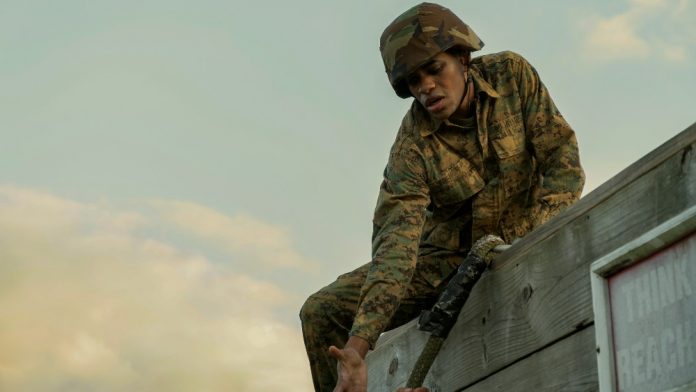Elegance Bratton is a pretty amazing new filmmaker on the scene whose debut narrative feature, The Inspection, was selected to close the storied New York Film Festival this year after premiering at the equally prestigious Toronto International Film Festival.
Though the acclaimed A24 film is based on Bratton’s own life and his experiences in the military, it casts Broadway star Jeremy Pope (Netflix’s Hollywood) as young protagonist Ellis French, a gay Black man who has been rejected by his homophobic mother (Gabrielle Union) and bounces around various homeless shelters before he decides to enlist in the Marines. The film covers French’s time during boot camp, where he deals with non-stop grilling from his sergeants (played by Bokeem Woodbine and Raúl Castillo) and ruthless hazing from his fellow recruits. French must overcome a variety of challenges, all in the hope of winning back his mother’s love and respect.
It’s impossible not to be inspired by the story Bratton tells in The Inspection, just as it’s hard not to be inspired by Bratton after hearing his powerful story first-hand, which is just what Above the Line did over Zoom a couple of weeks back.
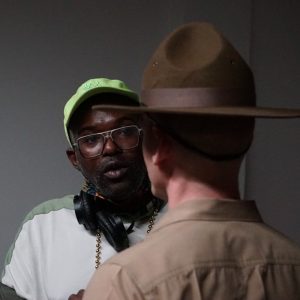
Above the Line: The story behind this movie alone is pretty amazing, but the first time I heard about it was when it was announced to close this year’s New York Film Festival, and I thought, “Who is this director?” I did read a little about your background and how it provided inspiration to make this movie, but was this something that you had been working on for a long time before you finally got it made?
Elegance Bratton: First of all, thank you, Ed, for making the time to talk to us about this film. It is such a joy to know that we’re gonna have our voices heard. This movie, it comes from my life experience. This movie comes from a super personal place. I became a filmmaker through the Marine Corps, and ultimately, I joined the Marine Corps, because I love my mother more than anything. I just wanted her to respect me and to love me back. Through boot camp, I learned how to respect myself.
My mom [kicked] me out, [and] when I got a chance to come back to New York City as a military police officer, my mother — she was a real tough lady — would just be like, ‘You’re supposed to this filmmaker. Why don’t you get a camera and come film your little sister’s elementary school graduation?’ I went, and none of my sister’s friends or classmates knew she had a brother. None of my mother’s [friends] knew that she had an elder son.
On that day, I resolved to be a filmmaker. You are not going to ignore me. You’ll go to the theater, you’ll see my poster; you turn on the TV, you’re going to see my name. Someone’s going to ask you if I’m your son.
That moment coincides with the fact that I was kicked out of my house for being gay at 16. I spent 10 years homeless. I thought being gay meant that I had no future, that I was worthless, because my mother told me that as young as I can remember [and] as often as I can remember, and it wasn’t until I joined the Marine Corps, [where] I was fortunate enough to have a drill instructor tell me that my life had meaning, value, and purpose, because of my ability to protect the person to my left and to my right. That was a really transformational moment.
I have to begin there because it’s those two realizations that inform the experience of The Inspection. It’s the foundation of what I want audiences to take away. I want anyone who’s ever felt disregarded [and] overlooked, or who’s ever felt like “my life has no meaning, no value, no purpose,” I want you to know you have a value, you have a meaning — you can protect someone, and that’s important.
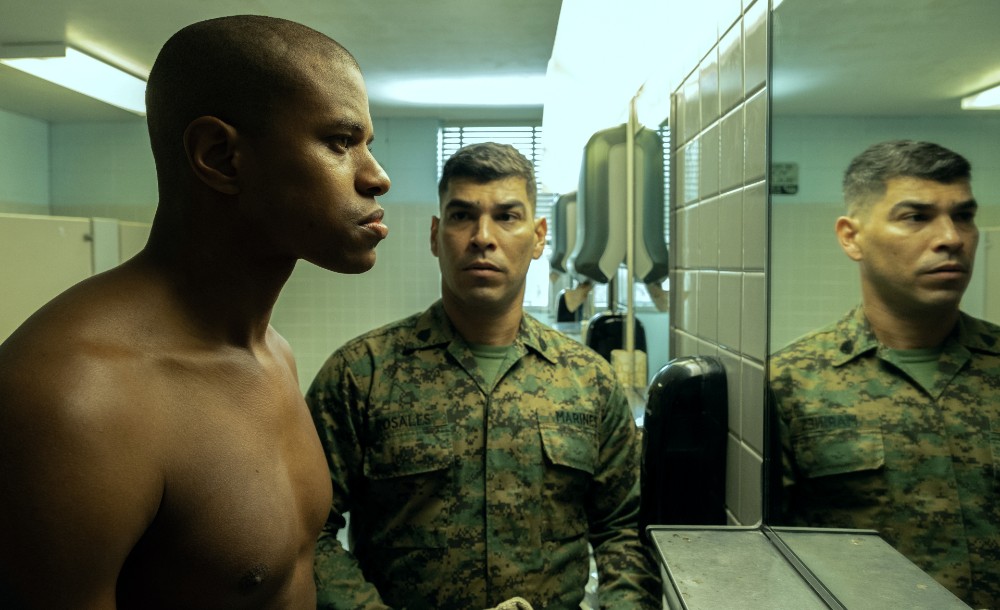
That’s where it comes from, and then from a logistical standpoint, I wrote the first draft in 2017, right after we’d sold the show My House to Viceland, and then kind of went through some different labs. Like, I went through a lab at Tisch, my graduate film lab, and they gave me some notes. I met Tony Gilroy [and] the great Kasi Lemons, and they all gave me notes. Spike [Lee] gave me notes at school that I didn’t listen to at first, but then I ended up doing everything he said later [laughs]. That’s why he has a Special Thanks [credit]. If I listened to [him] four years ago, maybe I would have gotten this movie made quicker, but it took about six years from the first script to what you saw onscreen.
ATL: I found it interesting that you had a sister in real life, but there’s no mention of her in the movie.
Bratton: No, this movie was really about establishing what it meant for me, as a Black gay man going into the Marines. It’s hard to describe in an interview like this, but the way my mother set up the relationship, I was not involved in my sister’s life, because my mother did not want her around me. The way I experienced that time was between my mother and [me], and that’s what this movie is all about. This is one man’s journey to win back his mother’s love, against all odds, and then he ultimately learns how to respect himself. This is Rocky. This is how someone can find that light to overcome great tragedy.
ATL: Was your time in the Marines in that whole post-9/11 era where people were going off to war for the wrong reasons?
Bratton: It’s set in 2005, during the time I went into boot camp. I went right after Thanksgiving of 2005, so I had Christmas at boot camp. That scene where they talk about Jarhead? That happened. That was the one day the [sergeants] really can’t torture you. It’s weird because then they have to show a different side of themselves. That’s when you end up realizing [that] they’re human beings, to be honest.
ATL: Did A24 get involved fairly early on? Did they get involved even before you shot or did they come on board after it was finished?
Bratton: I went to college undergrad with one of the executives on this film, Zack Vargas-Sullivan, and when I wrote the first draft, I immediately took it to Zack. He gave notes throughout the whole process, and A24 is a really special company in that everybody has to agree to do it – not just the development executives, but the marketing and advertising, the interns. Everybody has to agree to want to make the movie. With Zack’s guidance and support, we were able to get to a place, and then, Chester [Algernal Gordon], my partner, was the main producer on it, and we ended up meeting Effie Brown at the last L.A. Film Festival Gala. Chester is just an incredible momentum-type of producer, so he walked right up to Effie and said, “Hey, I got a movie you got to do.” They took a picture together, and then two years later, Effie came on board, and once Effie came on board, A24 had what they needed to go forward. Every movie is kind of a miracle, and this miracle came together in such an interesting way.
ATL: A24 has done a great job establishing itself as a trustworthy brand, to the point where people are showing up to a movie just because they’re distributing it.
Bratton: I always knew it had to be an A24 movie, too, from the very beginning. I’ve always wanted it to be an A24 film, so there’s a lot of joy for that.
ATL: Was it an organic thing for you to start being a camera person in the Marines? How did that happen that you picked up a camera and started doing that?
Bratton: I’m in the shelter. I’m 25 years old. I call my Mom up, asking if I could come back home. She says, “Are you still gay?” I say, “Yes,” and she’s like, “Maybe you should join the military.” I was incensed. “Are you saying I should be blown up rather than being in your home gay?” I went back to the shelter that night to sleep, and I kind of looked around and I saw these older men sleeping there, and I’m like, “Is that my life? Is this my future?” The next morning, a Marine recruiter approached me, and I was like, “If I could look half as good as you do in that uniform, please sign me up.”
I took an ASVAB, which is a placement exam, [and] scored really high. My recruiter marked off the top three jobs. The first job was intelligence. I’m nobody’s snitch, I couldn’t do that. The second job was journalism, and I’ve got too much of an opinion on me to be a good journalist [without] bias. I just don’t know how to be unbiased. And then the final job was a combat camera operator, and it just looked cool. There was a guy hanging out upside down from a helicopter over a jungle with a telephoto lens. And I was like, ‘Alright, maybe that makes sense,’ and so I picked it.
Once I got in, I basically had to work my way up. I did graphic design, cleaned the office spotlessly, took photos, [did] web design — anything I could get my hands on to get into the film studio. Gratefully, I had a good corporal, my friend Randy Frowse, who invited me to hold the camera for the first time., and then once I held the camera, everything took off from there. I never really went back to any of the other stuff after that. So, that’s how it happened.
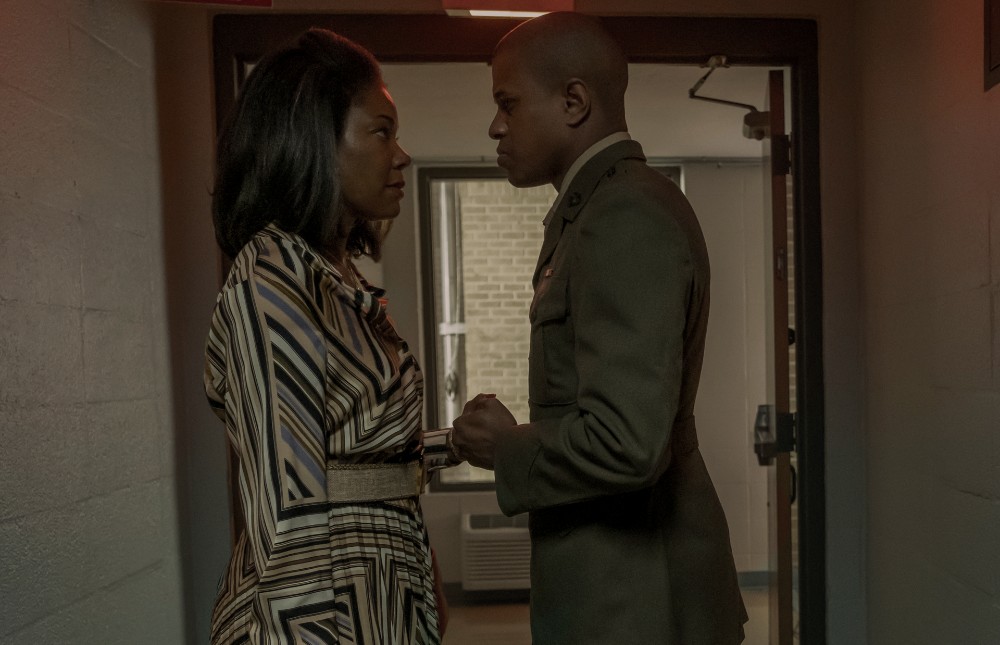
ATL: Did you end up going to Columbia to study film?
Bratton: I went to Columbia undergrad for African-American Studies, anthropology, and French, and then, while at Columbia University, I kind of had this moment of “where is home for me?” For kids at that school, home is ever-present. They get letters, care packages, things like that. It just wasn’t happening for me, and simultaneously, I had a sociology class on social networks, and I realized that home for me was on Christopher Street Pier, and I began making Pier Kids. I had this producer on Pier Kids at Columbia, who towards the end of our time there was like, ‘Oh, I’m doing this movie about homeless, trans black folks, and you used to be homeless, [and] you’re gay and Black. I’m gonna apply to the Tisch School of the Arts, and they’re gonna think I’m the future of diversity,’ and I was like, “If he can go to Tisch with my film, maybe I can go to Tisch.” And I applied to Tisch, so that’s how all of that came about.
ATL: Let’s talk about your star, Jeremy Pope. He’s an amazing find, and I wasn’t aware of him, so he was new to me. What was it about Jeremy that made you say, “He’s the guy to represent me”?
Bratton: First of all, authenticity of casting was really important to me. It had to be an out, Black, queer actor. As a black gay man, [for] a lot of my life, my identity is kind of cobbled together in this Frankenstonian kind of way, where you get what you need of yourself wherever you can find it. We’re in a world where one out of two black gay men is projected to be HIV-positive in their lifetime. We’re eight times more likely to commit suicide, eight times more likely to be homeless. Jeremy and I talked about this all the time: What it would have meant to us as teenagers to have a movie like this where we get to be the hero? Ultimately, French’s journey of self-acceptance is one that I think a lot of people have to go through. Everyone goes through some version of this, so it was important to cast someone who comes from it, [so] that people can see themselves and have hope that they can overcome and triumph the struggles that they face. This is a movie about radical, defiant empathy, so right away, it had to be that. Then when I met Jeremy, just from the first conversation, I knew that he was brilliant. I call it the Cate Blanchett test. He could just sit there on camera – you’re not really saying anything, there’s no other actor in the room with you, but from how you express [yourself], you can understand what’s happened before and what’s to come. It’s compelling. Jeremy has that quality in spades, so, as we collaborated together in creating French, I just felt so safe in his care. We had such a shorthand with one another. I didn’t have to work so hard to explain who I am. Rather, we were discovering the emotional truth, and that process was transformative for me a human being. I believe it will be that way for audiences as well. I hope so.
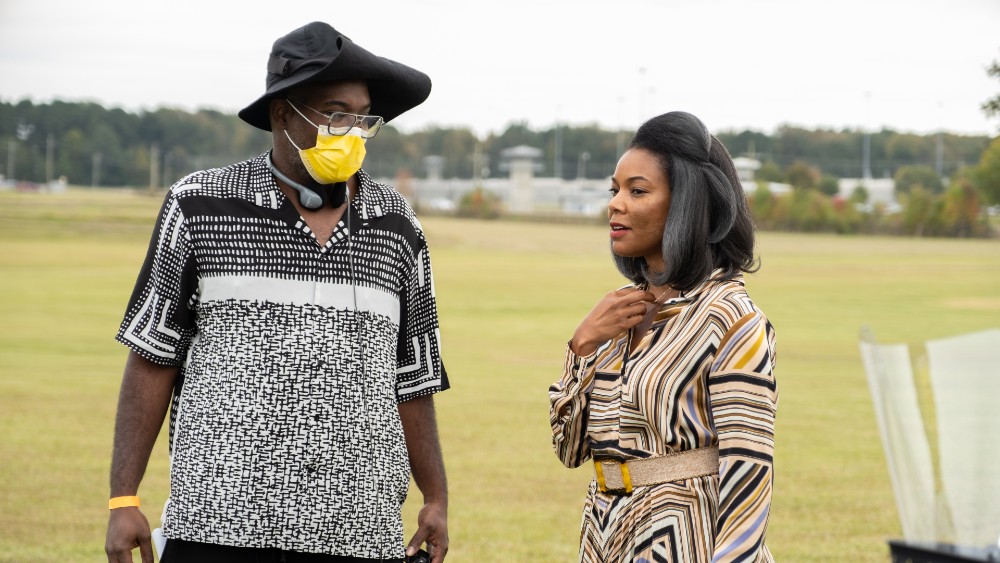
ATL: To wrap things up, I was curious if you ever were able to make peace with your mother. I know she passed away, but was she able to see the movie or did she know that you were making it, at least?
Bratton: I guess the best way I can answer is to say that in our life, we’re all kind of spinning and juggling plates, and when you die, the plates come crashing to the ground. If you’re lucky enough, you have someone in your life that loves you, that wants to know you and understand you, to put those pieces back together. Unfortunately, my mother passed really a couple of days after we got this film greenlit. After she passed, I got a chance to go to her home — it’s not the home I grew up in — and when I got to that home, I discovered that my mom had printed out all of my web clippings. She had my New York Times article in the house. Unfortunately, we never got a chance to reconcile, but this is why I made this. This is why I’m so grateful to Gabrielle Union; she really brought my mother back to life for me. In so doing, she gave me a chance to find closure, and to really understand her as a human being. The jewelry that Gabby wears in this film is my mother’s jewelry, the Bible that she read from is my mother’s Bible. I’m hopeful that audiences will watch this film, and remember that you’re important. You matter, you are enough, and we need you. We need each other. So while I didn’t get a chance to directly tell my mom, I hope people who think like my mom, watch this movie and have a change of heart.
The Inspection is now playing in select cities, and it will continue to expand nationwide in the coming weeks.


